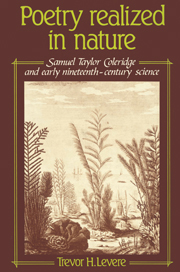Book contents
- Frontmatter
- Contents
- Preface
- Introduction: nature and mind
- CHAPTER 1 Early Years: From Hartley to Davy
- CHAPTER 2 Surgeons, Chemists, and Animal Chemists: Coleridge's Productive Middle Years From the Biographia Literaria to Aids to Reflection
- CHAPTER 3 Two Visions of the World: Coleridge, Natural Philosophy, and the Philosophy of Nature
- CHAPTER 4 Coleridge and Metascience: Approaches to Nature and Schemes of the Sciences
- CHAPTER 5 The Construction of the World: Genesis, Cosmology, and General Physics
- CHAPTER 6 Geology and Chemistry: The Inward Powers of Matter
- CHAPTER 7 Life: Crown and Culmination
- Notes
- Index
Introduction: nature and mind
Published online by Cambridge University Press: 09 October 2009
- Frontmatter
- Contents
- Preface
- Introduction: nature and mind
- CHAPTER 1 Early Years: From Hartley to Davy
- CHAPTER 2 Surgeons, Chemists, and Animal Chemists: Coleridge's Productive Middle Years From the Biographia Literaria to Aids to Reflection
- CHAPTER 3 Two Visions of the World: Coleridge, Natural Philosophy, and the Philosophy of Nature
- CHAPTER 4 Coleridge and Metascience: Approaches to Nature and Schemes of the Sciences
- CHAPTER 5 The Construction of the World: Genesis, Cosmology, and General Physics
- CHAPTER 6 Geology and Chemistry: The Inward Powers of Matter
- CHAPTER 7 Life: Crown and Culmination
- Notes
- Index
Summary
Samuel Taylor Coleridge, in the organic unity of his thought, worked constantly toward a system reducing “all knowledges into harmony.” Thomas McFarland has observed that “the urge to system is a reflection, in the special realm of philosophy, of a universal concern, the need to harmonize, to tie things together – what we may call the need for reticulation.” This need impelled Coleridge to attempt to reconcile conflicting systems of thought, and to make room for all facts of experience.
He was determined to construct a scheme that was truly comprehensive, encompassing the reality and dignity of external nature, the moral sense and freedom of will of mankind, and God, in whom man had his being. Faith in this scheme was not irrational, but rather subsisted “in the synthesis of the reason and the individual will.” Trinitarian Christianity came to provide a unifying logic for this scheme, and that logic in turn supported Christianity, in a mutual interdependence: “True philosophy rather leads to Christianity, than contained anything preclusive of it.” Coleridge asserted, indeed, “that it was one of the great purposes of Christianity … to rouse and emancipate the soul from … debasing slavery to the outward senses, to awaken the mind to the true criteria of reality, namely, permanence, power, will manifested in act, and truth operating as life.”
Coleridge held fast to the reality of man's moral being and to that of external nature.
- Type
- Chapter
- Information
- Poetry Realized in NatureSamuel Taylor Coleridge and Early Nineteenth-Century Science, pp. 1 - 8Publisher: Cambridge University PressPrint publication year: 1981
- 1
- Cited by



